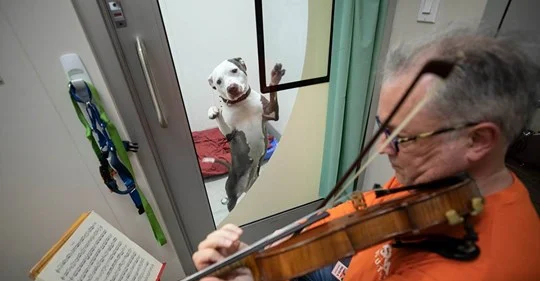Professional musician, Martin Agee strode into the compact concert hall. He unfolded his rolling chair, propped his sheet music on a metal stand and tucked his violin under his left chin. Agee pulled his rosined bow from its case and hovered it above the fret.
It was opening night — and this was his solo.
Some in the audience were cringed into corners. Others nervously paced the aisles. One clamored against the thin, glass barricade separating him from the soloist.
Agee was not in Carnegie Hall or the Sydney Opera House. He was at the American Society for the Prevention of Cruelty to Animals’ (ASPCA) Adoption Center in New York City. His audience: a bevy of abused and neglected shelter dogs.
Almost from the second Agee’s bow drew across the strings, his audience was transfixed and transformed. Hyper dogs mellowed. Fearful dogs craned their necks or inched forward toward their musical guest. Such was the power of Bach, Handel and Mozart — as well as their interpreter.
That was two years ago. Every few weeks since, Agee totes his violin to the shelter’s Animal Recovery Center which provides sanctuary for animals coping with medical and behavioral issues born of human cruelty.
“It’s an emotional experience,” Agee told Today. “And it has been since day one.”
Agee began volunteering at the ASPCA to rebuild his connection with companion animals after the death of his beloved rescued greyhound, Melody. Soon thereafter he signed on as an adoption coordinator. Agee was fascinated by the ASPCA’s storytelling program, in which volunteers read to anxious shelter pets, and proposed introducing music to soothe so many wounded hearts.
Kris Lindsay, senior director at the ASPCA, lauds Agee’s serenades as a magical adjunct to the shelter’s storytelling program.
“It’s really incredible to watch the impact his music has on the dogs and how quickly they respond,” Lindsay told Today. She reported that many dogs in the Animal Recovery Center are brought in by New York City Police after responding to animal cruelty complaints. Often, the dogs require prompt medical attention and behavioral interventions and can be quite fearful of humans, Lindsay added. More often than not, the shelter’s auditory enrichment activities are central to the dogs’ recovery and in preparing them for adoption.
Listening to humans read or play music provides the shelter dogs with much-needed socialization, Lindsay observes. “This brings the dogs an opportunity to meet new people and learn that strangers bring good things.”
Playing for his four-legged audience brings Agee good things, too.
Free from the bright lights and the critics’ pen, away from cloistered and monotonous practice sessions, Agee has found a venue that lets his fingers sing — and his audience swell to new heights.
“Here [at the ASPCA] I just feel like I can come and just make music,” he said. “And I know that no matter what comes out . . . my audience is going to, in some way, benefit from it. At least, that’s my hope.”
It would appear that Agee has turned his hope into a reality.

